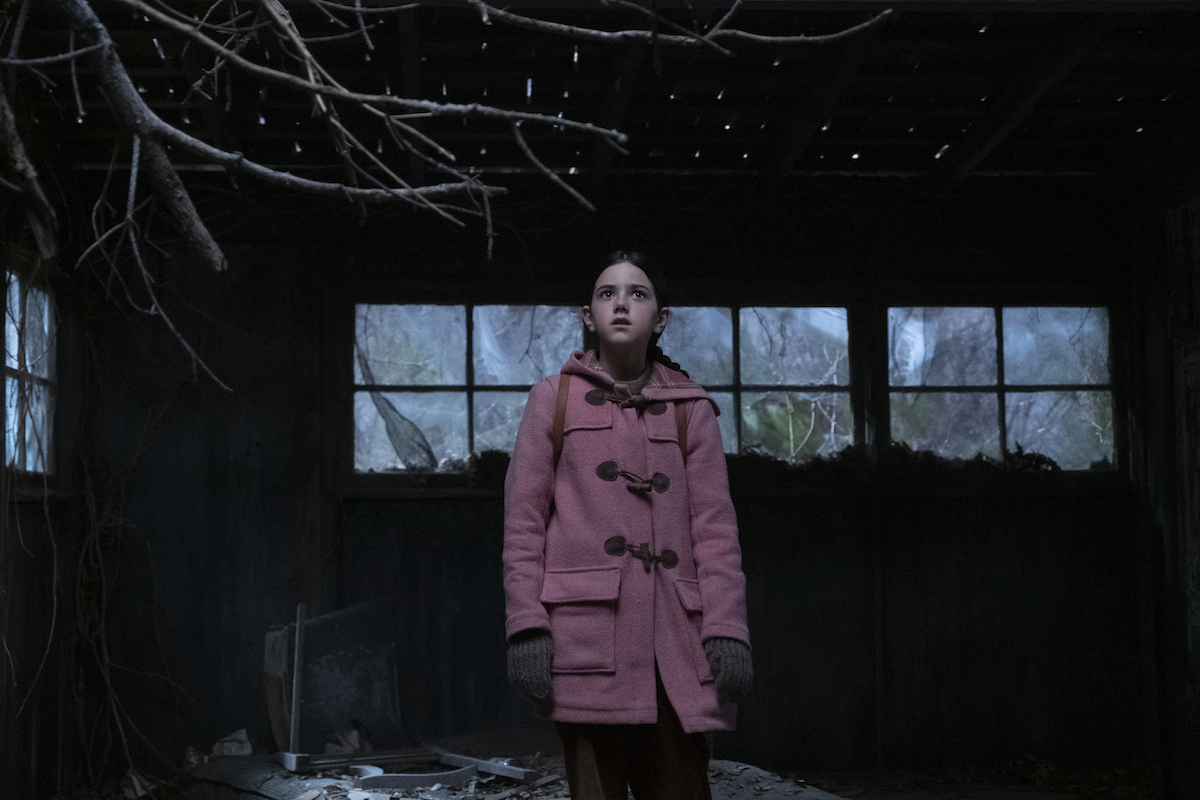The slow, rhythmic sound emanating ominously from an unknown source has always been a reliable hook in science fiction, taking such forms as the encroaching footsteps of a dinosaur in “Jurassic Park” or the radio signal from deep space in “Contact.” In the case of Amazon’s new sci-fi series, “Tales from the Loop,” based on the illustrated short story compilation by Swedish artist Simon Stålenhag, the noise emanates from an underground particle accelerator resembling Epcot Center. Dubbed “The Eclipse,” it represents the heartbeat of The Loop, an enormous machine designed to transcend our notion of what is impossible by investigating the universe’s most confounding mysteries.
With a set-up promising untold wonders, it’s a bit of a letdown when the three hour-long episodes made available for review—prior to all eight premiering on Friday, April 3rd—tread such familiar territory. I kept being reminded of Denis Villeneuve’s “Arrival” in everything from the show’s somber mood and gloomy color palette to the Magritte-like juxtaposition of alien imagery set against a mundane landscape, where tractors hover just slightly off the ground. Most striking of all is a looping motif expressing the circular nature of existence that is reflected in the narrative structure, character relationships, production design, recurring dialogue, shots framed to echo previous ones, even the revolving title card that clicks into place. It’s enough to make you dizzy, yet is there enough here to keep you watching?
Created and written by “Legion” producer Nathaniel Halpern, the series attempts to replicate Stålenhag’s haunting visions of a Sweden from roughly three decades ago inhabited by robots, yet what is visually arresting on the page occasionally proves drab on the screen. Introducing the first episode, a la Rod Serling, is Russ (Jonathan Pryce), mastermind of experimental physics, who entices us for an anthology of stories that are connected not only to The Loop (which he founded) but to each other. It isn’t so much that each episode contains a separate story but that the focus shifts to a new character, making the task of reviewing the first, fourth and sixth episodes akin to enduring the butchered cut of “A Star is Born.” It’s difficult to appreciate what’s onscreen without yearning for what’s been left out.

For all of its supposed interest in science, there isn’t a whole lot of discussion regarding the ramifications of certain events that would almost certainly rupture the space time continuum. Halpern is more concerned with the emotional impact of such an encounter, raising the sort of universal questions that may cause us to lie awake at night: Are there parallel planes of existence? What would you do if you met yourself? If you had the chance to learn how long your life will be, would you want to find out? Considering that none of the episodes are all that surprising in their various twists and turns, their apparent aim is not to wow us but to break our heart, as suggested by the gorgeous swells of Philip Glass and Paul Leonard-Morgan’s score (which is easily my favorite thing about the show thus far). Though “Tales from the Loop” has yet to exhilarate me like the best “Twilight Zone” episodes or films such as “The Sixth Sense” and “Frequency” have, I’m not yet convinced that it won’t.
Heading the program’s impressive array of guest directors is its executive producer Mark Romanek (“One Hour Photo), who helms the first episode—titled “Loop”—which is the most intriguing and tension-filled of the three I’ve seen. The opening scenes anchor their largely wordless storytelling in the expressions of Abby Ryder Fortson, best known as Paul Rudd’s adorable daughter in “Ant-Man,” who effortlessly goes toe-to-toe with co-star Rebecca Hall (playing Russ’ daughter-in-law Loretta) and quickly proves herself to be a fierce screen presence. Romanek cleverly pays homage to the famous shot in “The Wizard of Oz” where the farmhouse falls back to earth, as Forston’s enigmatic, Dorothy-esque heroine suddenly finds herself without her home or her mother, Alma (Elektra Kilbey), whose smiling face we see sinking into shadow, as if in a nightmare. Indeed, people come and go so quickly here.
To say more would veer into dreaded spoiler territory, though Hall is such a superb actress that I could read the big reveal on her face long before it’s articulated. There are various acting choices made here that are all the more rewarding when viewed in retrospect, even as certain plot points still leave me puzzled. That being said, it builds up a certain promise of adventure that never quite pays off in the other two hours screened for critics. Whereas Russ initially comes off as some sort of indestructible wizard, he eventually proves to be as vulnerable as anyone, helpless in the face of his own mortality. The fourth episode, “Echo Sphere,” reaffirms Pryce’s status as one the finest actors working today, with his wrenching portrayal of an ailing man desperate to not disappoint his grandson, Cole (Duncan Joiner), with his inevitable exit. It’s such a tonal departure from the previous episode that it feels like it belongs in a different series, as we keep waiting for a more escapist shoe to drop that never arrives.

I’m convinced this episode could’ve been condensed into an Oscar-winning short film from Pixar, which is only appropriate considering that its director is Andrew Stanton of “Finding Nemo” and “WALL-E” fame. A concluding montage encompassing the full arc of a life in fleeting, vividly realized vignettes is the sort of inspired touch I could imagine Pixar’s team of animators working overtime to perfect, as they did with the similarly tearjerking prologue of “Up.” It’s also a rare example of Halpern’s dialogue refusing to overstate the meaning of a key image, which brings the episode full circle while poetically echoing a line from Pryce—one that also happens to illuminate a crucial theme in Stanton’s oeuvre.
Neither of these tales quite prepared me for the sixth episode, “Parallel,” which veers into overtly comedic territory with its kinky spin on “Somewhere in Time.” Security guard Gaddis (Ato Essandoh, in a breakthrough performance) secretly spends his days fantasizing about an absurdly hunky dreamboat, Alex (Jon Kortajarena), whose photograph he randomly found in his tractor. Thanks to a circular portal produced by The Loop, Gaddis is swept into a parallel dimension where he quite literally finds himself living with Alex. Having previously tackled opposing doppelgängers and the fallacy of perfection in his provocative 2014 indie, “The One I Love,” director Charlie McDowell is clearly an ideal choice for this material and he provides an exceptional showcase for Essandoh, who never confuses the viewer as to which version of Gaddis he’s playing, even though both are identical. The slapstick feels a bit forced at times (must every protagonist be prone to shattering objects?), and the resolution struck me as all too easy, though it does match the bittersweet warmth of the other two segments.
Perhaps these episodes would’ve been more effective had they run a half-hour, since the added time provides us ample space to figure things out well before the characters do. I’m curious to learn more about Loretta’s husband (Paul Schneider), whose conspicuous lack of emotion combined with his mechanical arm made me wonder if he’s merely a more advanced robot. Another promising cast member is Daniel Zolghadri (as Cole’s older brother), who brilliantly performed one of the definitive scenes of the #MeToo era in “Eighth Grade.” I’m not sure I’ll tune in for the rest of the show, but since my interest in HBO’s snail-paced series “The Outsider” ran out around the same time it doubled its viewership, I may be in the minority. For many people currently confined to their homes, this cozily predictable show might be just the campfire story they’re craving, reminding us that we are all intrinsically connected and that if we look carefully, light can always be found in the darkness.












